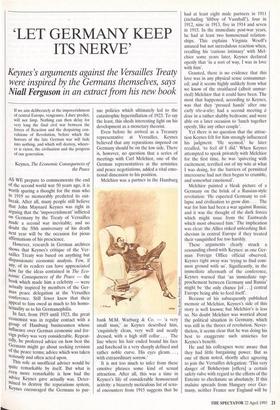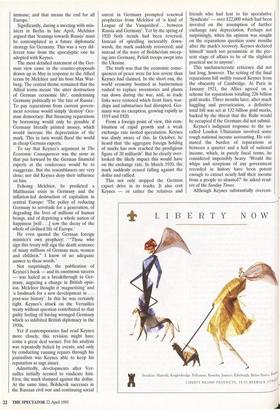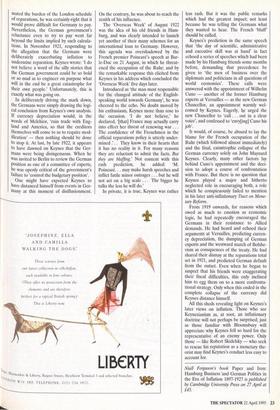`LET GERMANY KEEP ITS NERVE'
Keynes's arguments against the Versailles Treaty were inspired by the Germans themselves, says
Niall Ferguson in an extract from his new book If we aim deliberately at the impoverishment of central Europe, vengeance, I dare predict, will not limp. Nothing can then delay for very long the final civil war between the forces of Reaction and the despairing con- vulsions of Revolution, before which the horrors of the late German war will fade into nothing, and which will destroy, whoev- er is victor, the civilisation and the progress of our generation.
Keynes, The Economic Consequences of the Peace AS WE prepare to commemorate the end of the second world war 50 years ago, it is worth sparing a thought for the man who in 1919 so memorably predicted its out- break. After all, many people still believe that John Maynard Keynes was right in arguing that the 'impoverishment' inflicted on Germany by the Treaty of Versailles made a second war inevitable; and no doubt the 50th anniversary of his death next year will be the occasion for pious affirmations of his prescience. However, research in German archives shows that Keynes's critique of the Ver- sailles Treaty was based on anything but dispassionate economic analysis. Few, if any, of its readers can have appreaciated how far the ideas contained in The Eco- nomic Consequences of the Peace — the book which made him a celebrity — were actually inspired by members of the Ger- man peace delegation at the Versailles conference. Still fewer knew that their appeal to him owed as much to his homo- sexuality as to his Germanophilia. In fact, from 1919 until 1923, the great economist was in regular contact with a group of Hamburg businessmen whose Influence over German economic and for- eign policy was very considerable. Repeat- edly, he proferred advice on how best the Germans might go about seeking revision of the peace terms; advice which was taken seriously and often acted upon. This role as unofficial adviser would be quite remarkable by itself. But what is even more remarkable is how bad the advice Keynes gave actually was. Deter- mined to destroy the reparations system, Keynes encouraged the Germans to pur- sue policies which ultimately led to the catastrophic hyperinflation of 1923. To say the least, this sheds interesting light on his development as a monetary theorist.
Even before he arrived as a Treasury representative at Versailles, Keynes believed that any reparations imposed on Germany should be on the low side. There is, however, no question that a series of meetings with Carl Melchior, one of the German representatives at the armistice and peace negotiations, added a vital emo- tional dimension to his position.
Melchior was a partner in the Hamburg bank M.M. Warburg & Co. — 'a very small man,' as Keynes described him, `exquisitely clean, very well and neatly dressed, with a high stiff collar . . . The line where his hair ended bound his face and forehead in a very sharply defined and rather noble curve. His eyes gleam. . . , with extraordinary sorrow.'
It is not too much to infer from these emotive phrases some kind of sexual attraction. After all, this was a time in Keynes's life of considerable homosexual activity: a bizarrely meticulous list of sexu- al encounters from 1915 suggests that he had at least eight male partners in 1911 (including liftboy of Vauxhall'), four in 1912, nine in 1913, five in 1914 and seven in 1915. In the immediate post-war years, he had at least two homosexual relation- ships. This explains Virginia Woolf s amused but not incredulous reaction when, recalling his 'curious intimacy' with Mel- chior some years later, Keynes declared openly that 'in a sort of way, I was in love with him'.
Granted, there is no evidence that this love was in any physical sense consummat- ed; and it seems highly unlikely from what we know of the straitlaced (albeit unmar- ried) Melchior that it could have been. The most that happened, according to Keynes, was that they 'pressed hands' after one early tete-a-tete; had a second meeting a deux in a rather shabby bedroom; and were able on a later occasion to 'lunch together openly, like any other couple'.
Yet there is no question that the attrac- tion Keynes felt for him strongly influenced his judgment. 'He seemed,' he later recalled, 'to feel a3 •I did.' When Keynes attempted to speak privately with Melchior for the first time, he was 'quivering with excitement, terrified out of my wits at what I was doing, for the barriers of permitted intercourse had not then begun to crumble, and somewhat emotional'.
Melchior painted a bleak picture of a Germany on the brink of a Russian-style revolution: 'He expected Germany to col- lapse and civilisation to grow dim . . . The war for him had been a war against Russia; and it was the thought of the dark forces which might issue from the Eastwards which most obsessed him.' The implication was clear: the Allies risked unleashing Bol- shevism in central Europe if they treated their vanquished foe too harshly.
These arguments clearly struck a resounding chord with Keynes: as one Ger- man Foreign Office official observed, Keynes right away was 'trying to find com- mon ground with us'. Significantly, in the immediate aftermath of the conference, Keynes warned that 'an immediate rap- prochement between Germany and Russia' might be 'the only chance [of . . .] central Europe being able to feed itself.
Because of his subsequently published memoir of Melchior, Keynes's side of this story is well known; but Melchior's is less so. No doubt Melchior was worried about the political situation in Germany, which was still in the throes of revolution. Never- theless, it seems clear that he was doing his best to exaggerate such anxieties for Keynes's benefit.
He and his colleagues were aware that they had little bargaining power. But as one of them noted, shortly after agreeing to join the Versailles delegation: 'This very danger of Bolshevism [offers] a certain safety valve with regard to the efforts of the Entente to checkmate us absolutely. If this malaise spreads from Hungary over Ger- many, neither France nor England will be immune; and that means the end for all Europe.'
Significantly, during a meeting with min- isters in Berlin in late April, Melchior argued that 'leanings towards Russia' must be contemplated as a future diplomatic strategy for Germany. This was a very dif- ferent tone from the apocalyptic one he adopted with Keynes.
The most detailed statement of the Ger- man view came in the counter-proposals drawn up in May in response to the Allied terms by Melchior and his boss Max War- burg. The central theme remained that the Allied terms meant 'the utter destruction of German economic life', condemning Germany politically to 'the fate of Russia'. To pay reparations from current govern- ment revenue would simply 'destroy' Ger- man democracy. But financing reparations by borrowing would only be possible if Germany literally printed money, which would increase the depreciation of the mark. This in turn would flood the world in cheap German exports.
To say that Keynes's argument in The Economic Consequences was the same as that put forward by the German financial experts at the conference would be to exaggerate. But the resemblances are very close; nor did Keynes deny their influence on him.
Echoing Melchior, he predicted a Malthusian crisis in Germany and the inflation-led destruction of capitalism in central Europe: 'The policy of reducing Germany to servitude for a generation, of degrading the lives of millions of human beings, and of depriving a whole nation of happiness [will . sow the decay of the whole of civilised life of Europe.'
He even quoted the German foreign minister's own prophecy: "Those who sign this treaty will sign the death sentence of many millions of German men, women and children." I know of no adequate answer to these words.'
Not surprisingly, the publication of Keynes's book — and its enormous success — was hailed as a breakthrough in Ger- many, auguring a change in British opin- ion. Melchior thought it 'magnetising' and `a landmark for a new development in . . . post-war history'. In this he was certainly right. Keynes's attack on the Versailles treaty without question contributed to that guilty feeling of having wronged Germany which so inhibited British diplomacy in the 1930s.
Yet if contemporaries had read Keynes more closely, this revision might have come a great deal sooner. For his analysis was repeatedly belied by events; and only by conducting running repairs through his journalism was Keynes able to keep his reputation as sage intact.
Admittedly, developments after Ver- sailles initially seemed to vindicate him. First, the mark slumped against the dollar. At the same time, Bolshevik successes in the Russian civil war and continuing social unrest in Germany prompted renewed prophecies from Melchior of 'a kind of League of the Vanquished . . . between Russia and Germany'. Yet by the spring of 1920 both trends had been reversed. Instead of spiralling inexorably down- wards, the mark suddenly recovered; and instead of the wave of Bolshevism sweep- ing into Germany, Polish troops swept into the Ukraine.
The truth was that the economic conse- quences of peace were far less severe than Keynes had claimed. In the short run, the world economy boomed as businessmen rushed to replace inventories and plants run down during the war, and, as trade links were restored which front lines, war- ships and submarines had disrupted. Ger- many was no exception, growing rapidly in 1919 and 1920.
From a foreign point of view, this com- bination of rapid growth and a weak exchange rate invited speculation. Keynes was dimly aware of this. In October, he heard that 'the aggregate foreign holding of marks has now reached the prodigious figure of 20 milliards'. But he clearly over- looked the likely impact this would have on the exchange rate. In March 1920, the mark suddenly ceased falling against the dollar and rallied.
This not only stopped the German export drive in its tracks. It also cost Keynes — or rather the relatives and friends who had lent to his speculative `Syndicate' — over £22,000 which had been invested on the assumption of further exchange rate depreciation. Perhaps not surprisingly, when his opinion was sought on the reparations question some months after the mark's recovery, Keynes declared himself 'much too pessimistic at the pre- sent stage of affairs to be of the slightest practical use to anyone'.
This uncharacteristic reticence did not last long, however. The setting of the final reparations bill swiftly roused Keynes from the obscurity of Cambridge. At Paris in January 1921, the Allies agreed on a scheme for reparations totalling 226 billion gold marks. Three months later, after much haggling and prevarication, a definitive total bill was set at 132 billion gold marks, backed by the threat that the Ruhr would be occupied if the Germans did not submit.
Keynes's indignant response to the so- called London Ultimatum involved some rough national income accounting. He esti- mated the burden of reparations at between a quarter and a half of national income, which, in purely fiscal terms, he considered impossibly heavy. 'Would the whips and scorpions of any government recorded in history have been potent enough to extract nearly half their income from a people so situated?' he asked read- ers of the Sunday Times.
Although Keynes substantially overesti- mated the burden of the London schedule of reparations, he was certainly Tight that it would prove difficult for Germany to pay. Nevertheless, the German government's reluctance even to try to pay went far beyond the limits implied by such calcula- tions. In November 1921, responding to the allegation that the Germans were deliberately exacerbating inflation to undermine reparation, Keynes wrote: 'I do not believe a word of the silly stories that the German government could be so bold or so mad as to engineer on purpose what will in the end be a great catastrophe for their own people.' Unfortunately, this is exactly what was going on.
In deliberately driving the mark down, the Germans were simply drawing the logi- cal conclusion from Keynes's own analysis. If currency depreciation would, in the words of Melchior, 'ruin trade with Eng- land and America, so that the creditors themselves will come to us to require mod- ification' — then nothing should be done to stop it. At last, by late 1922, it appears to have dawned on Keynes that the Ger- mans were being disingenuous. When he was invited to Berlin to review the German position as one of a committee of experts, he was openly critical of the government's failure to 'control the budgetary position'.
One might have expected Keynes to have distanced himself from events in Ger- many at this moment of disillusionment. On the contrary, he was about to reach the zenith of his influence.
The 'Overseas Week' of August 1922 was the idea of his old friends in Ham- burg, and was clearly intended to launch yet another of their many schemes for an international loan to Germany. However, this agenda was overshadowed by the French premier Poincare's speech at Bar- le-Duc on 21 August, in which he threat- ened the occupation of the Ruhr; and by the remarkable response this elicited from Keynes in his address which concluded the `Overseas Week' five days later.
Introduced as 'the man most responsible for the changed attitude of the English- speaking world towards Germany', he was cheered to the echo. No doubt moved by his enthusiasm, Keynes more than rose to the occasion. 'I do not believe,' he declared, `[that] France may actually carry into effect her threat of renewing war . . . The confidence of the Frenchmen in the official reparations policy is utterly under- mined : . . They know in their hearts that it has no reality in it. For many reasons they are reluctant to admit the facts. But they are bluffing.' Not content with this rash prediction, he added: 'M. Poincare. . . may make harsh speeches and inflict futile minor outrages . . . but he will not act on a big scale . . . The bigger he talks the less he will do.'
In private, it is true, Keynes was rather less rash. But it was the public remarks which had the greatest impact; not least because he was telling the Germans what they wanted to hear. The French 'bluff' should be called.
Keynes's prediction in the same speech that 'the day of scientific, administrative and executive skill was at hand' in fact echoed a series of speeches which had been made by his Hamburg friends some months before, demanding that precedence be given to 'the men of business over the diplomats and politicians in all questions of world economics'. These calls were answered with the appointment of Wilhelm Cuno — another of the former Hamburg experts at Versailles — as the new German Chancellor, an appointment warmly wel- comed by Keynes. Eagerly, he urged the new Chancellor to 'call . . out in a clear voice', and confessed to `envy[ing] Cuno his job'.
It would, of course, be absurd to lay the blame for the French occupation of the Ruhr (which followed almost immediately) and the final, catastrophic collapse of the German currency solely on John Maynard Keynes. Clearly, many other factors lay behind Cuno's appointment and the deci- sion to adopt a course of confrontation with France. But there is no question that Keynes played a major and hitherto neglected role in encouraging both, a role which he conspicuously failed to mention in his later anti-inflationary Tract on Mone- tary Reform.
From 1919 onwards, for reasons which owed as much to emotion as economic logic, he had repeatedly encouraged the Germans in their resistance to Allied demands. He had heard and echoed their arguments at Versailles, predicting curren- cy depreciation, the dumping of German exports and the westward march of Bolshe- vism as consquences of the treaty. He had shared their dismay at the reparations total set in 1921, and predicted German default from the outset. Even when he began to suspect that his friends were exaggerating their fiscal difficulties, this only inclined him to egg them on to a more confronta- tional strategy. Only when this ended in the complete collapse of the currency did Keynes distance himself.
All this sheds revealing light on Keynes's later views on inflation. Those who see Keynesianism as, at root, an inflationary doctrine will not perhaps be surprised; just as those familiar with Bloomsbury will appreciate why Keynes fell so hard for the representative of an enemy power. Only those — like Robert Skidelsky — who seek to rescue his reputation as a monetary the- orist may find Keynes's conduct less easy to account for.
Niall Ferguson's book Paper and Iron: Hamburg Business 'and German Politics in the Era of Inflation 1897-1927 is published by Cambridge University Press on 27 April at £45.




























































 Previous page
Previous page